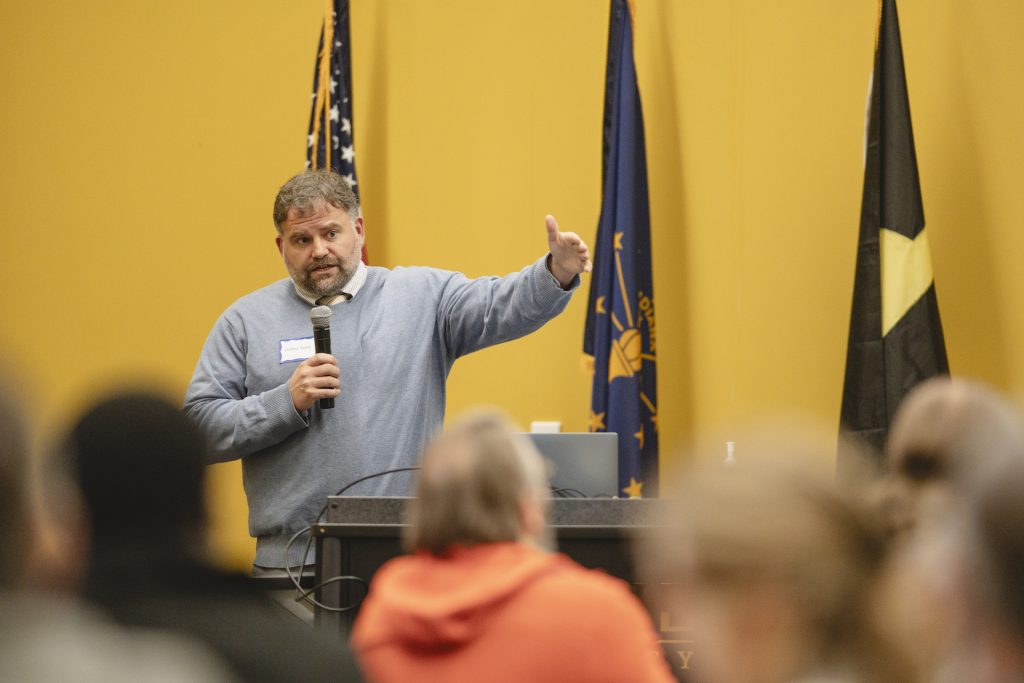WEST LAFAYETTE, Ind. — Eat more bugs.
James Stack offered that advice as he stood before a giant projected slide showcasing buffet-style trays of insects. Though presented somewhat jokingly, the director of Great Plains Diagnostic Network at Kansas State University emphasized the connection between plant biosecurity and national security at the 2024 meeting of the University Consortium of Health, Food and Agriculture Resilience (HFAR) at Purdue University’s Beck Agricultural Center.
Hosted by the HFAR branch of the Purdue Applied Research Institute (PARI), the event that took place Feb. 5 and 6 highlighted the importance of food and agriculture to national security.
Stack’s bug comment wasn’t entirely a joke, however. Nearly 60% of the world’s population depends on a plant-based diet, which is threatened from changes in climate and land use, population growth, pathogens, and pests. Exploring alternative food sources and developing crops that can adapt to these new stressors are crucial in building a robust and resilient food supply chain.
When people think of national security, the military and defense often come to mind. Few consider plant and zoonotic diseases or climate events as national security threats, but they can impact food security and lead to instability. President Joe Biden recently signed National Security Memorandum-16, which aims to strengthen the security and resilience of the U.S. food and agriculture system, a vital step toward protecting national security.
Over two days at Purdue, approximately 80 researchers, government officials and industry leaders — the consortium’s membership — discussed preventing, mitigating and recovering from threats and hazards to our health, food safety and agricultural systems.
“Agriculture itself isn’t enough to build resilience,” said Karen Plaut, Purdue’s executive vice president for research. “Engineering, social sciences and economics all play crucial roles in addressing these issues.”
HFAR is part of PARI, the nonprofit applied research arm of Purdue that provides infrastructure and advanced facilities to support mission-critical efforts of federal agencies as well as industry and nongovernmental organizations.
“PARI understands that national security encompasses more than national defense,” Plaut told the audience. The nation must feel safe and secure in environments and livelihoods to ensure economic prosperity. “We all share the mission of promoting national and economic security,” she said.
Threats to the agriculture system are a large concern, and they closely mirror some of the biggest issues in national defense: cybersecurity, supply-chain resilience and attacks of chemical, biological, radiological and nuclear origin.
Ransomware, for instance, is especially harmful to the food and agricultural sector, said Scott Algeier, executive director of the Information Technology – Information Sharing and Analysis Center (IT-ISAC) and the Food and Ag-ISAC. Such attacks lead to operations and supply-chain disruptions and financial losses, among other problems. There were 2,905 reported ransomware incidents in 2023, and nearly 5,000 incidents since 2020, Algeier noted. Just since Dec. 1, 2023, there have been 179 ransomware attacks globally; 88 were against U.S. entities and nearly 8% of those were in the food and agriculture sectors.
Beyond traditional national security concerns, other issues endanger the global ecosystem. Stack identified invasive plant species as a rapidly growing threat to food security, human and animal health, and biodiversity. He noted that these species primarily travel via passenger and commercial ocean vessels, citing the maize chlorotic mottle virus — a complex disease threatening corn production — as an example. This virus spread from Kansas to China, Kenya and Ecuador over 40 years through trade.
HFAR director Josh Detre lauded the conference’s alignment with PARI’s goals.
“While significant work remains in this crucial area, the ability to connect, discuss these matters and collaborate with subject matter experts from across the country on crafting a national research agenda for a more resilient food and agricultural ecosystem perfectly embodies PARI’s mission,” he said. “Hosting these leaders and experts at Purdue was a privilege.”
WRITER/MEDIA SOURCE: Evamarie Socha, ecsocha@purdue.edu
SOURCE: Josh Detre, detre@purdue.edu
